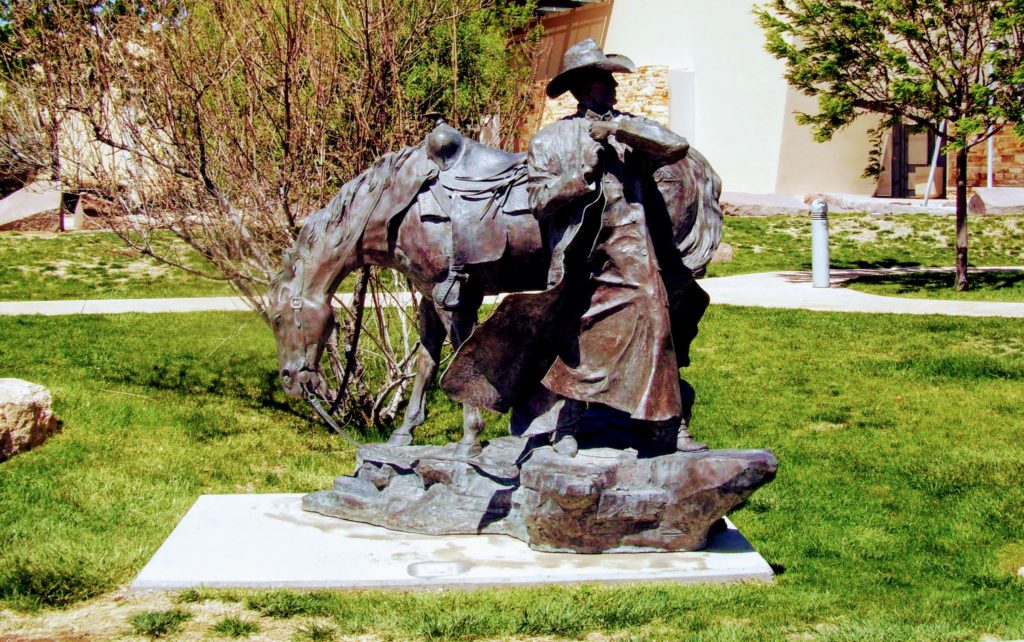Global Salvation
Isaiah 49: Even if mothers forget, I’d never forget you — never.
The prophet describes the glorious reign of the Messiah, looking not only to his distant future, but to ours as well. The work of the Messiah isn’t only to provide salvation to the people of Israel, but to bring, in his words, “global salvation.” Of course, that’s good news for me, since I’m on the “global” side of the equation. Isaiah envisions some of his fellow Israelites looking at their current situation and thinking that God has forgotten them. Their lives are anything but glorious and, while they want to hear this good news, they can’t get their hearts around it. To them, Isaiah says, “Can a mother forget her own child? God has been Father and Mother to us and he hasn’t forgotten us.” Israel has messed up in every way and her sin has had real, and painful, consequences. In the darkness of those consequences she feels forsaken and forgotten. But it isn’t so. God reaches out to them with the compassion of a mother nursing her infant. Israel isn’t the only one who’s messed up. The world is filled with people who’ve had far more failures than successes in their moral lives. Does this describe you? If so, the message of this passage isn’t just for ancient Israelites; it’s God’s word to you, today.
Take Away: The Lord reaches out to us with the compassion of a mother reaching out for her infant child.
Tag: Compassion
Devotional on Isaiah
Beyond having church
Isaiah 58: This is the kind of fast days I’m after….
The people Isaiah ministers to know how to do religious things. They stay busy with worship activities and doing what we’d call Bible studies. They practice prayer and fasting, spiritual disciplines that need some serious attention in the lives of most of us Christians today. However, they’re dissatisfied with the results of this frenzy of religious activity and complain to God about it. The Lord’s reply, through Isaiah, focuses on their failure to translate their “church” activities into their everyday lives. If they want to please God they’re going to have to tackle injustice, exploitation, and oppression in their world. They’re going to have to not just fast a meal or a day, but to share their food with those who are hungry, invite the homeless into their homes, and show loving concern for the needy of the world. Aren’t you glad that, these days, we just have to believe in Jesus and not worry about all that extra stuff? You know that isn’t true. Could it be that the problem of the powerless Church is that we think all our religious activities is what God wants when he’s clearly stated his demands in passages like this one? I do want God to answer my prayers and I want his blessing on my life. Maybe it isn’t that I don’t fast enough meals as much as it is that I don’t care for the hurting, down-and-out people he sends into my life.
Take Away: There’s more to religion than just going to church on Sunday.
Devotional on Jeremiah
The Lord, reaching out
Jeremiah 31: Everything in me cries out for him. Softly and tenderly I wait for him.
In this passage the tribe of Ephraim represents the people of Israel. Jeremiah imagines Israel humbly coming to the Lord, asking if it’s too late and wondering if the Lord can ever embrace her again. God’s answer is immediate and compassionate. The Lord says that that’s all he’s wanted to hear all along and that the strong medicine was administered not because he had stopped loving Israel but preciously because of his love. This great God of love has longed for his people to return to him and with great tenderness he waits to receive them back to himself. I can’t help but respond to this passage in a personal way. I’m moved by God’s compassion on, not only ancient Israel, but on the lost people of my day. When I’m in rebellion against God he longs for my return; reaching out to me, crying out in love. Today, I stand in awe of the mercy, grace, and compassion of God for a lost human race.
Take Away: God is love.
Devotional on Amos

Just one of the shepherds
Amos 1: The Message of Amos, one of the shepherds of Tekoa.
Aside from the few words of introduction found in the opening of his writings, we know nothing of Amos. He isn’t a member of the royal family or priesthood and he doesn’t have any famous relatives. He describes himself as “one of the shepherds” of an unimportant town. Amos numbers himself with the poor and unprivileged people of his society. That standing flavors his entire ministry. When he speaks of poor people being mistreated he does so as one who has experienced that mistreatment. In about 40 years Israel will fall, rejected by God and defeated by her enemies. One of the reasons for that fall is that God’s people have separated themselves from the compassion of God to their poor. The book of Amos is an important book for people of all periods of history because, as Jesus said, “the poor you will always have among you.” How does God expect a prosperous nation to treat its poor? How does he expect we who live in comfortable, secure homes to treat those in our community who live in want? Finally, what if we fail at this point? Amos gives us a first-hand response to these questions.
Take Away: As a people of the Lord we can never separate ourselves from his compassion on the poor.
Devotional on Amos
Selling grandma for a buck
Amos 2: They’d sell their own grandmother.
The prophet begins his message by characterizing God as a prosecuting attorney who’s making his case against the accused. The Lord has been keeping records of the sins he’s seen and now he makes his case against them. Amos starts this prosecution by focusing on the nations surrounding Israel. I can imagine the cheers of agreement from his fellow countrymen as he does this. They have bones to pick with Tyre and Edom and Moab. Nothing pleases them more than hearing God pronounce his judgment on them. Then God’s man turns his attention to Israel. The formula “for three great sins, make that four” that was used in judging other countries is applied to Israel too. The meaning is that the more God looks into their affairs the more he finds wrong and worthy of condemnation. Concerning Israel, in particular, all the failures God mentions are clustered around how they treat poor people. The Lord charges that they see people as only “things – ways of making money,” he then adds, “They’d sell their own grandmother!” The Lord has a history of caring about people who are down and out. He also has a history of opposing those who take advantage of such people. As I read these words I find myself examining my own attitude toward the poor. I want to be on God’s side of this issue.
Take Away: The Lord cares for those who are society’s outcasts – his people are to join him in that concern.
Devotional on Obadiah
Another living parable
Obadiah 1: You stood there and watched.
It’s hard to call Obadiah a “book” of the Bible. The whole thing is two and a half pages long and so small that translators decided not to divide it into chapters. It’s also unique because the prophecy of Obadiah is addressed to a nation other than Israel or Judah. Obadiah is focused on their neighbor Edom. Way back in the book of Genesis we find the story of the unlike twins, Jacob and Esau. Here we find the expectant mother Rebekah experiencing such movement within her that she’s concerned about it. The Lord tells her that she’s pregnant with twins and that the two boys will be the founders of two nations that will never get along. In fact, they’re getting a head start on the conflict by fighting while still in the womb. No wonder Rebekah is both uncomfortable and concerned! The first born is Esau who becomes the founder of Edom. The younger is Jacob, who’s later called Israel. In Obadiah we find ourselves hundreds of years down the road. Israel is going through some devastating defeats while Edom watches from a safe distance. Not only does Edom watch it all but they rejoice in what they see. Their ancient enemy is being beaten up to the point of destruction. God’s man, Obadiah, turns his face toward this “brother” of Israel and utters a prophecy of condemnation. Edom and Israel may have a long history of disagreement but they’re still brothers who claim a common ancestry to Isaac. Obadiah tells them that by just watching and even cheering what’s happening to Israel that they’ve made themselves party to all the evil that’s being done. So to my surprise, even though I’m reading a tiny, little-read book of the Old Testament, I realize I’m reading a real life version of the parable of the Good Samaritan. In Obadiah’s scathing words, I see what God thinks of people who fail to show compassion on others, even their enemies, in their time of need.
Take Away: So, who is my neighbor?
Devotional on Obadiah

Good news for people who don’t find harp playing especially attractive
Obadiah 1: A rule that honors God’s kingdom.
The final words of Obadiah’s prophecy describe a coming golden age in which God’s people will be restored to their homeland. Beyond that, they’ll live righteously, in sync with the Lord’s purposes for them. Because of that they’ll be put in charge, ruling even over their old enemies of Edom. Their rule will not be that of a conquering nation, grinding their enemies into the ground, but a fair and just one, representative of their God who loves all human beings. I find it interesting that the Apostle Paul reflects this concept in his second letter to Timothy. Paul writes: “If we died with him, we will also live with him; if we endure, we will also reign with him.” At the very beginning of the Bible I see Adam and Eve who are placed in dominion over the earth. In this passage from Obadiah, I find a promised brighter day in which God’s people rule justly, throwing off the old animosities. Then, I see Paul looking forward to the return of Christ and his righteous people ruling with him. I don’t claim to understand all that might include, but it sounds like God has more in store for his people than merely sitting on a cloud playing a harp.
Take Away: As a people of the Lord we’re to reflect his love for all human beings.
Devotional on Jonah
God’s man isn’t much like God
Jonah 4: Jonah was furious.
The heart of the book of Jonah isn’t the first part with the oft-repeated big fish story. Instead, it’s the last part. It’s here that we find the motor that drives the story. When the reluctant prophet gives in and goes to Nineveh he does so in fear, not that he’ll fail, but that he’ll succeed. Jonah is nationalistic to the core and he’d like nothing better than for the capital city of Israel’s enemy, Assyria, to be destroyed. Still, with all his failings, Jonah knows a thing or two about God. The priests and other religious leaders of his country may promote a doctrine of Israel having a corner on the Almighty, but Jonah understands that God has compassion on all people. Israel may be the chosen people but that means God wants to use them to bless all the nations on earth, not that God loves them and hates all others. When Jonah runs from God, refusing to go to Nineveh he does so because he understands these things. He understands them, but he doesn’t agree with them. Now that his mission to Nineveh is a success Jonah’s angry with the Lord, not only for sparing his enemies when they repent, but for using him to bring it to pass. In spite of his unique understanding of God, Jonah isn’t much like God at all.
Take Away: God is love.
Devotional on Micah
Puns that aren’t intended to be “punny”
Micah 1: God’s Message as it came to Micah of Moresheth.
Micah is a contemporary of Isaiah, Amos, and Hosea and his message is similar to theirs. Some suggest that he’s a student of Isaiah because of their similarities. However, Isaiah lives in Jerusalem and has some strong connections there. Micah (like Amos) lives away from Jerusalem in a farming community. His focus, as is that of Amos, is on how the poor are treated by so-called religious people who tend to divorce their religious activities from how they actually live their lives. Micah is a witty guy who likes to use puns to make his points. Sadly, these puns are lost outside the original language. As we read from The Message we find them restored, but they’re almost lost from the other direction. When Micah says “Glorytown has seen its last of glory” he’s using a play on words. He’s named a real town whose name sounds like “glory.” The best modern example of this I’ve seen is the suggestion that it would be like Micah to say “Wiscon-sin needs to give up its sin.” Anyway, the early portion this little book is full of such plays on words. Still, there’s nothing light hearted about his message. Both Israel and Judah are going through the actions of serving God but in reality they’re missing the boat. If things continue as they are judgment is coming. History tells us that Micah is right on target.
Take Away: Having a good commentary is handy sometimes and absolutely necessary at others.
Devotional on Micah
The measure of my religion
Micah 2: Don’t preach such stuff.
The prophet preaches a message of destruction. Judah, he says, will be “wounded with no healing in sight.” Of course, this kind of preaching isn’t welcome. Some preachers proclaim another “gospel.” They say “nothing bad will happen to us” because God is “on the side of good people.” Micah finds this laughable. These very people mistreat the poor, ignoring God’s command to show compassion on them. They might know how to have a rousing worship service but their day to day lives have nothing God-like in them. Passages like this might be from the depths of the Old Testament and addressed to people who lived 2700 years ago but they ought to get our attention. Think of it, God isn’t impressed with our church services. He doesn’t care much about whether I raise my hands and shut my eyes and sing praise to him…well, at least he doesn’t care unless I go out the door and treat people with a love and compassion that reflects his concern for them. I know that it’s possible for me to sell out to a “social religion” and forget that God wants to have a personal relationship with me. However, it’s just as possible for me to think my religion is all about “God and me” while forgetting it’s just as much about “me and thee.”
Take Away: How we relate to one another is just as important to the Lord as how we relate to him.
Devotional on Micah

Micah 6: He’s already made it plain how to live, what to do.
This passage is one of the gems of the Old Testament. Micah asks the rhetorical question: “How can I…show proper respect to the high God?” He wonders if bigger offerings will do it: lots of rams and barrels of oil. He wonders if following the practice of the pagans and offering his child as a sacrifice will satisfy the Lord. Having asked the question he then states the answer. God has already made his desires for the human race abundantly clear. Micah says, “It’s quite simple: Do what is fair and just to your neighbor, be compassionate and loyal in your love, and don’t take yourself too seriously – take God seriously.” Micah’s insight into God’s purposes for people is breathtaking. Some have called this the “John 3:16” of the Old Testament. I do well to take this dusty old statement of God’s purpose for humanity and use it as a guide to my life. How am I doing on the “fair and just, compassionate and love” standard set here? Do I have a handle on not taking myself too seriously while taking God very seriously? There’s nothing in the Bible any more “contemporary” than this statement.
Take Away: Am I living up to the standard of the Lord?
Devotional on Zechariah

God’s priority list
Zechariah 7: The message hasn’t changed.
The question asked concerning the day of fasting in memory of the destruction of Jerusalem opens the way for the Lord to restate what he requires of his people. Through Zechariah the Lord reminds them that his requirements are unchanged. He isn’t very interested in their traditions but he’s very interested in how they treat one another. He’s always called for them to love their neighbors and be compassionate in their dealings with one another. Also, the Lord still has a special concern for widows, orphans, outsiders, and the poor. If these Jews want to please the Lord, they’ll focus on these things more and on their traditions less. Zechariah goes on to describe how, when their ancestors ignored these things that the Lord became angry with them and scattered them throughout the world. Is it possible that we spend too much time worrying about doing church properly and too little time pursuing the things the Lord lists here? When all is said and done, is the Lord more interested in how capably I can do church than he is in how I treat the poor? This passage ought to serve as a compass for all who consider themselves to be a people of God. Here we find a description of how God’s people ought to live.
Take Away: When all is said and done, the Lord is more interested in how we treat others than in how we do church.
Devotional on Matthew

Priorities
Matthew 15: I hurt for these people.
I don’t think the stories of the response of Jesus to the Pharisees and his response to the hungry people out in the wilderness are necessarily intentionally placed as they are, but they do provide an interesting study in contrasts. For three days Jesus has ministered to people in a “deserted place.” Near the conclusion, the physical hunger of the people is obvious to Jesus, who has had his own intense hunger experience at the beginning of his ministry. Jesus remarks to the disciples that he hurts for them and then performs the miracle of the feeding of the four thousand. Earlier, though, Jesus has an encounter with the Pharisees and religion scholars who travel all the way from Jerusalem to check out his ministry. They immediately complain that the disciples don’t properly follow the rules concerning religious practice that they’ve set up. Jesus, in just a few words, puts them in their place and the disciples are somewhat concerned that Jesus has upset these powerful people. In this case, Jesus just shrugs his shoulders and says in so many words that what these people say or think doesn’t matter. Here’s our Lord dealing with different sets of people. Some, he says aren’t worth our time. Their words and opinions will be “pulled up by their roots” so we might as well just “forget them.” Others though are people who are hurting. They may not be important in the eyes of society, but they matter to God and should matter to us. In Jesus’ day, his priorities are upside down as far as the world is concerned. They still are. I’m a follower of Jesus and I want my priorities to reflect that. God help me to brush off that which isn’t worth a hill of beans and to figure out what really matters.
Take Away: Some things that others worry about aren’t worth our time and effort. Some things no one else worries about are.
Devotional on Luke

Jesus likes people of doubtful reputation
Luke 15: A lot of men and women of doubtful reputation were hanging around Jesus.
One problem the religious leaders have with Jesus is the type of people he attracts. He gets along with prostitutes and tax collectors, the very ones they use in their sermons as the kind of people who should be avoided at all cost. Jesus, though, welcomes them. He doesn’t tell them to go clean up their acts and then come back. Rather, he welcomes them just as they are. When the religious leaders complain about this, Jesus tells three “lost and found” stories. In each story that which is lost is of real value and in each there’s great rejoicing when it’s found. The religious leaders might think of these folks of doubtful reputation as worthless fodder for the fires of hell. Jesus, however, places great value on them and when one of them comes and listens and then chooses to be a friend of his he thinks a celebration is in order. As I read these lost and found stories I fear I’m less like Jesus and more like the religious leaders who are represented as the elder son in the final parable. In our society a Christian can pretty much saturate his or her life with “Christian stuff.” If I handle things right, I can avoid these people of “doubtful reputation” and not have to deal with them at all. If I do that, though, I have more in common with the religious leaders than I do with Jesus.
Take Away: Jesus loves lost people and so should I.
Devotional on Luke

Keeping a safe distance
Luke 22: Peter followed, but at a safe distance.
It’s the awful night before the crucifixion of Christ. Not long ago Peter and the other disciples promised their loyalty to Jesus. Now, though, he stands before the Chief Priest, alone. The disciples have fled in fear but Luke tells us Peter, under cover of darkness has followed. He’s close enough to see what’s going on but far enough back as to not be identified as a follower of Jesus. I fear that this describes many Christians and at certain times, maybe most of us. We’re following, but not “that” close. After all, sometimes being a follower of Jesus is just plain unhandy, not to mention possibly dangerous for some. For instance, someone who doesn’t smell very good needs some personal, up close attention. If I’m not careful, my revulsion will win out over my discipleship and I won’t even offer a cup of water in Jesus’ Name. Or, say someone at work isn’t a very nice person. People tend to give them a wide berth. Will I get close enough to show them Jesus? Because of the danger Peter follows, but at a safe distance. The thing is, before long he isn’t following at all.
Take Away: I want to follow Jesus closely enough that there’s no doubt that I’m with him.
Devotional on 1 Timothy

The social ministry of the church
1Timothy 5: Take care of widows who are destitute.
It’s a different culture and time so I need to be careful to find principles rather than try to apply specifics to passages like this. Paul instructs Timothy, first of all, to differentiate between younger widows, widows with family, and, what he calls “legitimate widows.” He thinks it’s best for younger widows to marry and get on with life. Families of widows are to take care of their own and not expect the church to do their job for them. However, the destitute widow, without means or family, is the responsibility of the church. Again, I need to look for principles here and not get mired down in specifics. For instance, family responsibility trumps church responsibility. Also, if my need can be handled through “more conventional” means, I’m to follow that route first. The church, I understand, has responsibilities to care for its people but it’s not to be the first solution. Paul gives Timothy a written policy to be followed here. If it’s followed, the energies and resources of the church won’t be hijacked by concerns that are best addressed elsewhere. On one hand, then, I have a fairly straightforward principle here. On the other hand, I have to admit that the practical application is quite challenging.
Take Away: The church has a role to play in social issues, but it generally isn’t the primary support organization.
Devotional on 1 Peter

The disposition of the believer
1Peter 3: Be agreeable, be sympathetic, be loving, be compassionate, be humble.
The original readers of this letter are under pressure, suffering for their faith. Not only that but they’re in the first generation of Christianity. In this passage Peter describes the general disposition of a believer. Christians are to be agreeable, sympathetic people. We’re to be known for our compassion on others and our humility concerning ourselves. We’re not to advance the cause of Christianity by force and people aren’t to have to worry about watching their “P’s & Q’s” when they’re around us. Even non-Christians are to feel comfortable and it should go without saying that we’re to treat one another in kind, agreeable ways. Sad to say, some believers haven’t gotten this memo. They think that they’re doing God a favor by forcing their moral code down people’s throats. They think they’re being good soldiers in his army by creating lots of collateral damage on fellow believers with whom they have a few differences of opinion. The question I need to ask myself is how do I score on this “agreeable, sympathetic, loving, compassionate, humble” test? Peter, it seems, can almost hear people’s self-justification at this point, so he adds: “That goes for all of you, no exceptions.” He continues, “That’s your job, to bless.” Of course, my non-Christian friends are to know that I believe there’s a superior way for them to live. At the same time, they’re to conclude an encounter with me feeling that they’ve been blessed and not cursed.
Take Away: Do people think of time with us as a blessing or a curse?
Devotional on Genesis
Abraham and Sarah and Hagar
Genesis 16: You’re the God who sees me!
The story of Abraham, Sarah, and Hagar is such a sad one. While I know that I’m reading an event from long ago that took place in a culture very different than mine, the way Hagar is treated is pitiful. Sarah, who’s childless, sees that those in the culture around her have a sort of solution for the problem. They use a slave girl as a surrogate. Apparently, giving one’s servant to one’s husband is less humiliating in that culture than being childless. Hagar has no say in the matter and Abraham docilely goes along Sarah’s foolish plan. When the girl gets pregnant by Abraham the already horrible situation begins to unravel further. Hagar, who has never had much of a chance in life, decides to run away from the people who’ve abused her. My belief is that her choice to run is probably the right one. However in this case and in this day and culture, there are extenuating circumstances. As she flees, she encounters the God she’s heard Abraham and Sarah talk about. To her amazement, God not only knows about Abraham and Sarah, he knows her name too. This God cares about her and gives her a promise similar to the one he gave Abraham years earlier. Hagar connects with the Lord and calls him El Roi – the “God who sees.” As I read this incident and then of Hagar’s second encounter with El Roi a few pages over, I’m reminded that God sees the plight of the outcasts of the world. He sees and he cares about their lives. Since I’m a worshiper of this seeing God my values ought to reflect his values. I’m to show compassion on those who are mistreated by society. As I’m able, I’m to help lift their burden. Whether I can do that or not, I’m to value them as people the God I worship, El Roi, sees and cares about.
Take away: God cares about the abused and the outcasts. I’m to do the same.
Devotional on 2 Chronicles
You can draw more flies with sugar….
2 Chronicles 10: Be considerate of their needs…they’ll end up doing anything for you.
Solomon’s accomplishments are impressive…and expensive! All of that building takes a lot out of the nation. When Solomon’s laid to rest and his son Rehoboam ascends to the throne his subjects come to him with a reasonable request: “give us a break!” For a generation they’ve faithfully served his father, focusing their efforts on accomplishing his grand projects. Now, they want to put their efforts into building their own lives, capitalizing on the prosperity Solomon brought to them. Rehoboam goes to his father’s advisors and asks for their opinion and they agree with the people. These folks were committed to Solomon, but Rehoboam is starting new. If he’ll back off and show compassion his father’s people will become his people. These advisors wisely add that, in the long run, he’ll get more accomplished by getting the people on his side than he’d ever get done by using his sovereign authority and just ordering them to work. I know that Rehoboam foolishly listens to the advisors of his own generation and manages to split the country but, for the moment, I’m taken with the wisdom of the first advice he receives. I think there are times when a leader sees a bigger picture than others do. At times like that, he or she may have to prod people to move in the right direction. However, most of the time a leader who conducts himself or herself as a servant who cares for people and has compassion on them is going to accomplish more. A leader who appreciates what people do, who has their best interests at heart, and who is willing to listen to what they say is going to almost always get more done.
Take Away: People follow leaders who they believe have their best interests at heart.
Devotional on the Psalms

Telling it like it was
Psalm 78: He…commanded our parents to teach it to their children.
Asaph’s longest psalm tells the story of Israel’s failure and God’s faithfulness. In the opening part of the psalm he states that its purpose is to tell their story so that the next generation will learn to trust God. Honestly, from Israel’s point of view this isn’t a very flattering story. Each verse of the song describes a failure of Israel and how God responds with compassion to rescue them from some mess they’ve gotten themselves into. I don’t know about you, but when I’m telling the “next generation” about God I usually skip the “I failed” part and jump straight to the “God helped” part. Maybe that’s a mistake. It might be that I’m unintentionally saving face instead of teaching others to trust God more. Of course, there are things in all our pasts that must be told carefully and at the right time, but there’s likely a time for the telling. If I’m not careful I give the impression that I wised up and decided to give my heart to the Lord. In doing that, I make God into a concerned bystander in my story, wringing his hands, hoping I’ll turn it all around and then pleased that I’ve done so. It really isn’t that way. It’s God who graciously reaches down into the mess I’ve made, bringing redemption. Yes, I have to cooperate with him, but he’s the one who ought to get all the credit. I need to be sure that “my story” is truly “God’s story.” A part of that is my, at the appropriate time and place, honestly admitting my failure. That gives God the glory and also gives hope to that one in the “next generation” who already has some spiritual failures of his or her own.
Take Away: It’s God who graciously reaches down into the mess I’ve made, bringing redemption.
